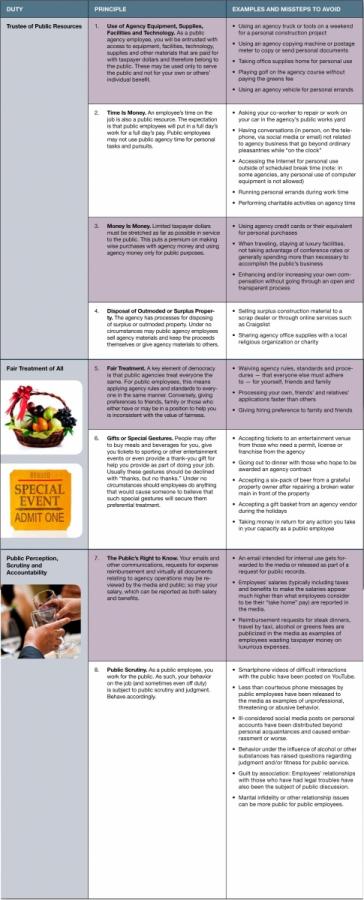Getting Public Employees Off to a Good Start
This column is a service of the Institute for Local Government (ILG), whose mission is to promote good government at the local level with practical, impartial and easy-to-use resources for California communities. For more information and to access ILG’s resources on public service ethics, visit www.ca-ilg.org/trust.
QUESTION
The public agency where I work takes ethics very seriously. I am particularly concerned with issues and reports involving legal and ethical missteps by public agency staff. Some media headlines have described instances of local agency employees using agency credit cards for personal purchases, uniformed public works employees being seen (and videotaped) drinking at lunch, employees being caught selling surplus agency property, agency supervisors filmed using public vehicles for personal errands and public employees going bowling during work hours (apparently a team-building exercise). These stories and reports must be very embarrassing to the leaders of the public agencies involved.
What can be done to prevent such lapses of judgment? How can we sensitize the public agency’s workforce to the special obligations of being a public agency staff member?
ANSWER
There is no silver bullet. One strategy is to monitor media reports for examples that can serve as a vehicle for continuing the dialogue within an agency about the importance of public perception and values-based decision-making. These kinds of reports can be a safe jumping-off point for supervisors to explore, both at the management level and with their staff, the type of thinking that may have led to the actions covered by the media.
A frequent blind spot for public employees is not thinking how such behavior could be cast in the most unflattering light by a reporter or blogger. Reminding staff that public employees’ behavior is subject to ongoing scrutiny is one strategy to help reduce that blind spot.
Another strategy, discussed in the Institute for Local Government (ILG) publication Promoting Personal and Organizational Ethics in Local Agencies (www.ca-ilg.org/ppoe), is to raise these issues during the hiring process. Emphasizing the agency’s mission and values during the recruitment and hiring process can help highlight the importance of ethics to the organization. Asking questions in the interview process that assess how a candidate might handle a difficult work-related ethical situation is another element of this strategy.
Implementing policies and practices that reinforce and promote legal and ethical behavior can help an agency prevent missteps. For example, many public agencies have greatly limited access to agency credit cards, for both staff and elected officials, as the result of scandals related to the misuse of such cards for personal purposes.
Publicizing these policies and practices is essential for such measures to succeed. However, policies can go only so far. The goal is for staff to understand the larger goals that the policies are trying to achieve — typically promoting public trust and confidence in the agency’s workforce.
The orientation process offers another opportunity to send an early and important message about the value the agency places on public trust and confidence. This can be achieved by letting those new to public service know that public employment can be significantly different from working in the private sector and informing them about what’s not OK and why.
To assist local agencies in this process, ILG offers the following sample language and chart below for local agencies to consider and/or adapt for use in their employee orientation materials.
The Special Nature of Public Service: Why It’s Different
Public service is a trust. Public agencies were created by the public to accomplish things that could not be done by individuals acting alone or with a profit motive. People who work in public agencies are entrusted with resources, power and authority. But the nature of that trust is that these resources, power and authority can be used only to benefit the public — not those in public service. This makes public service different from working in the private sector.
Public sector employees work for the public. As a public employee, you may have a supervisor who may be accountable to others in the organization. Ultimately, however, the agency is accountable to members of the public, who elect the agency’s governing body and also can decide how much revenue the agency will have to do its work. Through the ballot measure process, the public can even take decision-making authority away from elected officials and enact its own policies.
Click on image (left) or here for PDF of chart.
What This Means for You as a Public Employee
People who work for public agencies must hold themselves to the same high standards that the public has for those who are elected or appointed to public service. The exact combination of standards depends on a particular individual’s job within the organization. However, three cross-cutting principles apply to all public servants:
1. Public employees are stewards of scarce public resources;
2. Public agencies must treat everyone fairly, irrespective of who they know or are related to; and
3. Public service means one’s actions are subject to public scrutiny.
The chart at left provides details on these principles. Note that many of these principles are tied to laws that impose severe penalties — both fines and even jail time — for missteps.
Public service is based on trust. Earning the public’s trust and respect takes people committed to adhering to the legal duties and the principles of public service.
- In your public service, there will undoubtedly be times when you are tempted to put your own interests ahead of the larger organizational or public interest that you serve. Resist that temptation.
- As a public servant, there will be things that you might be able to do if you worked in the private sector that you can’t do because you are a public employee. This is why public service isn’t for everyone.
Do you have concerns? If at any time in your public service, issues arise that are similar to the examples given here, please bring them to the attention of your supervisor or another trusted individual at the management level (for example, in the Human Resources Department).
Good Starts for Elected and Appointed Officials
The Institute for Local Government (ILG) also offers materials to help local agencies get newly appointed and/or newly elected officials off to a strong start. These resources include materials about public service ethics but also cover more general issues.
On public service ethics, ILG offers:
- Understanding the Basics of Public Service Ethics; and
- “The ‘Front Page’ Test: An Easy Ethics Standard”
For more general orientation materials, visit www.ca-ilg.org/local-government-basics-those-new-public-service.
Photo credit: Rawpixel/Shutterstock.com; Ultimax/Shutterstock.com; ticket, zimmytws/Shutterstock.com; Maxim Leonidov/Shutterstock.com
This article appears in the October 2014 issue of Western
City
Did you like what you read here? Subscribe
to Western City



